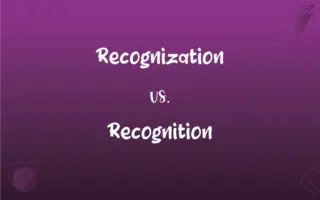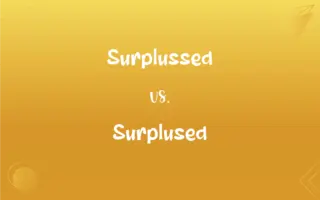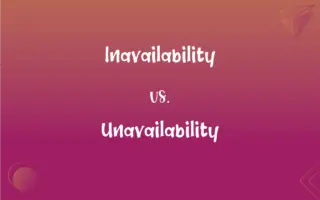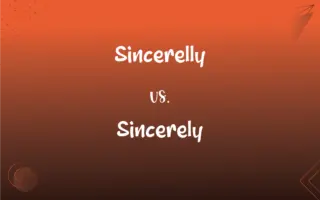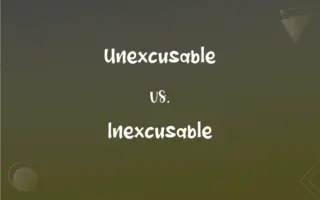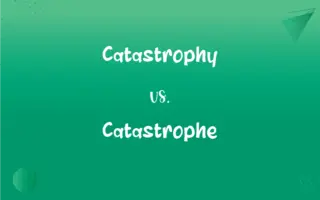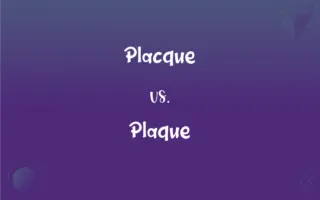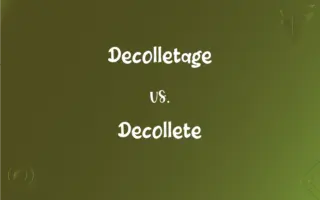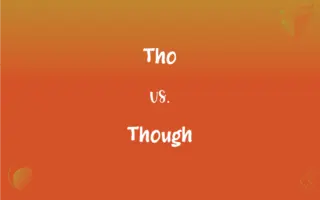Proove vs. Prove: Mastering the Correct Spelling
Edited by Aimie Carlson || By Janet White || Updated on March 14, 2024
"Proove" is an incorrect spelling. The correct spelling is "Prove", meaning to establish the truth or validity of something.
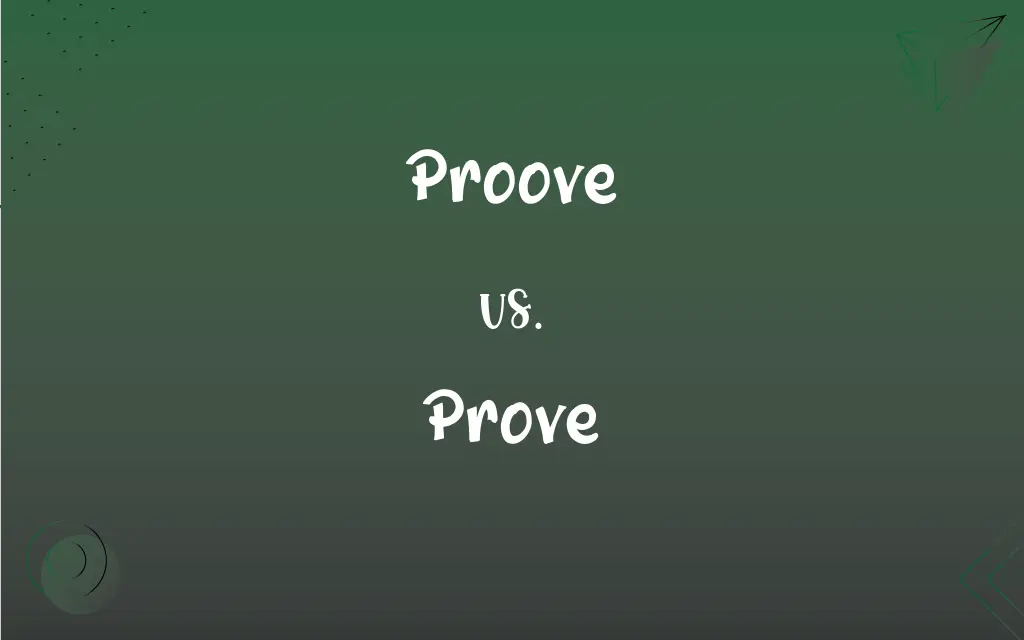
Which is correct: Proove or Prove
How to spell Prove?

Proove is Incorrect

Prove is Correct
ADVERTISEMENT
Key Differences
Envision a courtroom where a lawyer says, "I will prove it!"
Remember: no extra letters are needed to prove something.
Think of "Prove" as a "proof" without the "f" at the end.
Recall that "move" has no double "o", and similarly neither does "Prove".
Practice by writing, "To prove a point."
ADVERTISEMENT
Correct usage of Prove
The experiment was designed to proove the new hypothesis.
The experiment was designed to prove the new hypothesis.
They had to proove their skills in the final round of the competition.
They had to prove their skills in the final round of the competition.
She wanted to proove she could handle the project on her own.
She wanted to prove she could handle the project on her own.
I need to proove my theory with solid evidence.
I need to prove my theory with solid evidence.
He tried to proove his innocence in court.
He tried to prove his innocence in court.
Prove Definitions
"Prove" means to demonstrate the truth or existence of something through evidence.
The scientist could prove his theory.
"Prove" can indicate that someone establishes their ability or worth.
She wanted to prove herself in her new job.
To establish the truth or validity of (something) by the presentation of argument or evidence
The novel proves that the essayist can write in more than one genre. The storm proved him to be wrong in his prediction.
To demonstrate the reality of (something)
He proved his strength by doing 50 pushups.
To show (oneself) to be what is specified or to have a certain characteristic
Proved herself to be a formidable debater.
Proved herself to be worthy of the task.
To establish by the required amount of evidence
Proved his case in court.
To establish the authenticity of (a will).
To demonstrate the validity of (a hypothesis or proposition).
To verify (the result of a calculation).
To subject (a gun, for instance) to a test.
(Printing) To make a sample impression of (type); proof.
(Archaic) To find out or learn (something) through experience.
To be shown to be such; turn out
A theory that proved impractical in practice.
A schedule that proved to be too demanding.
(transitive) To demonstrate that something is true or viable; to give proof for.
I will prove that my method is more effective than yours.
(intransitive) To turn out; to manifest.
It proved to be a cold day.
(copulative) To turn out to be.
Have an exit strategy should your calculations prove incorrect.
(transitive) To put to the test, to make trial of.
They took the experimental car to the proving-grounds.
The exception proves the rule.
(transitive) To ascertain or establish the genuineness or validity of; to verify.
To prove a will
To experience.
To take a trial impression of; to take a proof of.
To prove a page
(homeopathy) To determine by experiment which effects a substance causes when ingested.
(baking) The process of dough proofing.
To try or to ascertain by an experiment, or by a test or standard; to test; as, to prove the strength of gunpowder or of ordnance; to prove the contents of a vessel by a standard measure.
Thou hast proved mine heart.
To evince, establish, or ascertain, as truth, reality, or fact, by argument, testimony, or other evidence.
They have inferred much from slender premises, and conjectured when they could not prove.
To ascertain or establish the genuineness or validity of; to verify; as, to prove a will.
To gain experience of the good or evil of; to know by trial; to experience; to suffer.
Where she, captived long, great woes did prove.
To test, evince, ascertain, or verify, as the correctness of any operation or result; thus, in subtraction, if the difference between two numbers, added to the lesser number, makes a sum equal to the greater, the correctness of the subtraction is proved.
To take a trial impression of; to take a proof of; as, to prove a page.
To make trial; to essay.
To be found by experience, trial, or result; to turn out to be; as, a medicine proves salutary; the report proves false.
So life a winter's morn may prove.
To succeed; to turn out as expected.
Be shown or be found to be;
She proved to be right
The medicine turned out to save her life
She turned up HIV positive
Establish the validity of something, as by an example, explanation or experiment;
The experiment demonstrated the instability of the compound
The mathematician showed the validity of the conjecture
Provide evidence for;
The blood test showed that he was the father
Her behavior testified to her incompetence
Prove formally; demonstrate by a mathematical, formal proof
Put to the test, as for its quality, or give experimental use to;
This approach has been tried with good results
Test this recipe
Increase in volume;
The dough rose slowly in the warm room
Cause to puff up with a leaven;
Unleavened bread
Take a trial impression of
Obtain probate of;
Prove a will
"Prove" can refer to testing something to establish its quality or performance.
The new car model will prove itself on the racetrack.
"Prove" may mean to turn out to be.
He proved to be a reliable friend.
"Prove" can also mean to validate or confirm something mathematically.
In geometry, we often need to prove theorems.
Prove Sentences
To join the team, you must prove your abilities in a trial.
He proved his loyalty to his friends in difficult times.
The test will prove whether the system is secure against attacks.
The results of the study prove the effectiveness of the new medicine.
The documentary aims to prove the impact of climate change.
Authors often prove their points by citing research studies.
They hope to prove the existence of a new planet with their research.
The success of the project will prove the team's hard work.
You don't need to prove yourself to anyone but yourself.
To prove his theory, he conducted numerous experiments.
The photographs prove that the event was well-attended.
His achievements prove that hard work pays off.
Prove Idioms & Phrases
Prove your mettle
To show one's ability to cope well with difficulties or to face a demanding situation in a spirited and resilient way.
She proved her mettle by leading the team to victory under pressure.
Prove a point
To demonstrate that something is true or to make a point clear.
He went out of his way to prove a point about honesty being the best policy.
Prove oneself
To demonstrate one's abilities or qualities to others.
She felt like she had to prove herself all over again at her new job.
Prove to be
To turn out to be or to be shown or found to have a particular quality or characteristic.
The strategy proved to be more effective than anticipated.
Prove beneficial
To result in advantages or positive outcomes.
The new study method proved beneficial for the entire class.
Prove wrong
To show that someone's opinion, belief, or assertion is incorrect.
He was determined to prove his doubters wrong.
FAQs
Which vowel is used before Prove?
The vowel "o" is typically used before "Prove".
What is the pronunciation of Prove?
"Prove" is pronounced as /pruːv/.
What is the root word of Prove?
The root word of "Prove" is derived from Latin "probare" meaning to test or prove.
What is the singular form of Prove?
"Prove" is a verb and doesn't have a singular or plural form like nouns do.
Which preposition is used with Prove?
"Prove" can be used with various prepositions like "to", "in", "by", depending on the context.
What is the verb form of Prove?
"Prove" itself is a verb.
Why is it called Prove?
The word "Prove" comes from Old French "prover" meaning to test or prove.
Is Prove a negative or positive word?
"Prove" is neutral; its connotation depends on the context in which it's used.
Which conjunction is used with Prove?
Any conjunction can be used with "Prove", like "and", "but", "or", depending on the sentence.
Which article is used with Prove?
The articles "a" or "the" can be used with nouns or adjectives related to "Prove", but not with the verb itself.
Is Prove an abstract noun?
No, "Prove" is not an abstract noun, it's a verb.
How many syllables are in Prove?
"Prove" has one syllable.
How do we divide Prove into syllables?
"Prove" is a one-syllable word and can't be divided further.
What is the plural form of Prove?
"Prove" as a verb doesn't have a plural form.
Is Prove an adverb?
No, "Prove" is not an adverb.
Is Prove a collective noun?
No, "Prove" is not a collective noun.
Is the word Prove is imperative?
Yes, in commands like "Prove it!".
What is a stressed syllable in Prove?
The entire word "Prove" is stressed as it's only one syllable.
What part of speech is Prove?
"Prove" is a verb.
Is Prove a vowel or consonant?
"Prove" is a word, not a vowel or consonant.
Is the Prove term a metaphor?
"Prove" itself is not a metaphor, but can be used metaphorically in certain contexts.
Is Prove a countable noun?
"Prove" is not a noun, so it's not countable.
What is the opposite of Prove?
The opposite of "Prove" is "disprove".
Which determiner is used with Prove?
Determiners like "this", "that", "my", etc., can be used with nouns or adjectives related to "Prove", but not with the verb itself.
What is the first form of Prove?
The first form of "Prove" is "prove".
What is the second form of Prove?
The second form of "Prove" is "proved".
What is the third form of Prove?
The third form of "Prove" is "proven" or "proved".
How is Prove used in a sentence?
E.g., "To win the case, the lawyer must prove his client's innocence."
Is Prove a noun or adjective?
"Prove" is primarily a verb.
What is another term for Prove?
Another term for "Prove" is "demonstrate".
About Author
Written by
Janet WhiteJanet White has been an esteemed writer and blogger for Difference Wiki. Holding a Master's degree in Science and Medical Journalism from the prestigious Boston University, she has consistently demonstrated her expertise and passion for her field. When she's not immersed in her work, Janet relishes her time exercising, delving into a good book, and cherishing moments with friends and family.
Edited by
Aimie CarlsonAimie Carlson, holding a master's degree in English literature, is a fervent English language enthusiast. She lends her writing talents to Difference Wiki, a prominent website that specializes in comparisons, offering readers insightful analyses that both captivate and inform.
